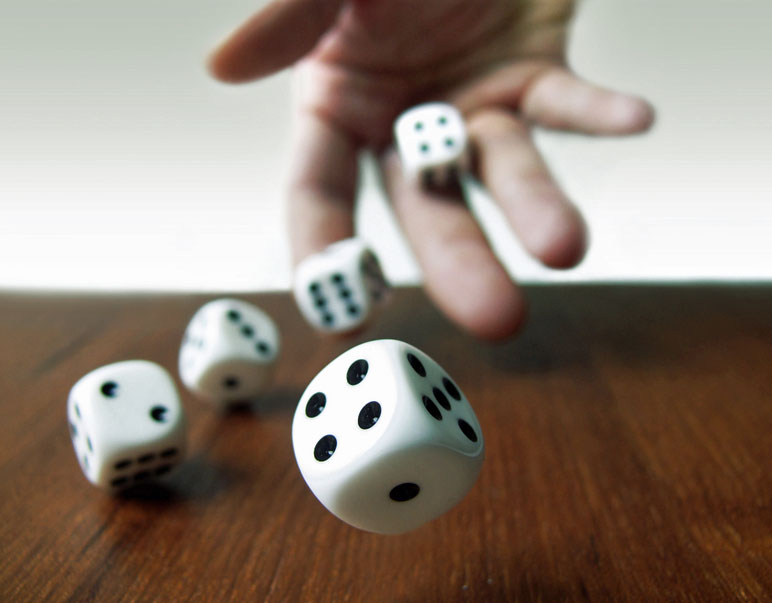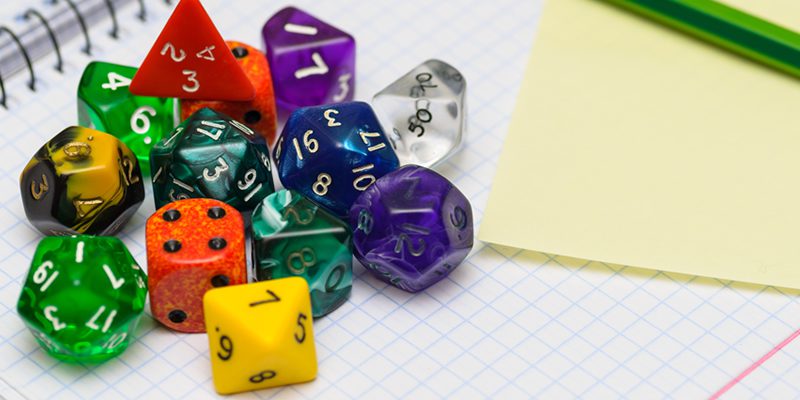When should GMs ask for Dice Rolls?

Have you ever asked your player to do a Perception check to see a paper with a clue they need over the table, even though it was extremely easy to spot, only to have them roll poorly? Now, what do you do? Do you have the other players roll as well, hoping for someone to get a good enough roll to uncover the paper they need to move the plot forward? Ok, you do that. The dice god wasn’t on their side and all results suck. You have cornered yourself from somewhere you have no way out.
If that ever happened to you (yes, I am starting this article like a dumb advertisement), then I created this product article just for you! In today’s article, I will teach you some Tips & Tricks so you can better understand when and why players should roll their die and when they shouldn’t. It is the GM after all who in most games asks players to roll. Nevertheless, it is very easy to do it wrong.
Interesting results
There’s one thing that is often said when this debate about when players should roll shows up. Players should only roll if the outcome of it provides an interesting result to the game. What does this mean? If the player characters enter a laboratory there’s no need to ask for a perception roll to describe the room. You may use that to add some extra important details or something difficult to find at a first glance, like a muffled voice coming from inside the room. However, if you use this roll to describe how the room looks like, how different would it have been the result if the players had failed the check? If you as a GM would have described pretty much the same, was there any need for a roll in the first place?
Opening a school locker is a particularly easy task if it is not locked. For this very reason, there’s no roll needed to open it. Climbing a tree? If there’s no time pressure and the player character isn’t in bad shape, it’s very likely they will be able to climb it. Whenever you are not sure if you should ask for a check for something first take a moment to think if the result is interesting enough to require a roll. Going back to the locker example, what happens if the player rolls poorly trying to open it? Accomplishing basic tasks doesn’t require a roll, and you are probably just slowing the game down by asking for this kind of rolls.
One game that does amazing at this is not actually a game but a whole system: Gumshoe. The Fall of Delta Green and Trail of Cthulhu are amongst the most well-known games that implement it. The reason I recommend this system is because of the way it manages checks. If the player character is proficient in hacking, then when they try to access the interweb to get some data they instantly succeed at it without the need of a roll. After all, if they are proficient at it this should be a pretty basic job for them. Someone who isn’t proficient at it may need to, just like the hacker may need to roll to drive a car at full speed on a highway to chase a criminal. If you ever have a chance of playing this system, try to give it a try. It really opens your mind on how to game master.

Retrying rolls
There are moments in our games in which failing a roll doesn’t mean we can’t keep trying. However, this usually provides boring results. If the thief fails at lockpicking the door, they can just try again until they get it right. Then where is the need for the roll? As stated before, this doesn’t give us an interesting result. The adventure we are playing, however, asks for a roll to open a door. Keep trying until it works just slows the game down and gives nothing of interest in return.
When should players reroll then? If the difficulty can be evaded by trying numerous times wasting time, then no roll should exist at all (more on that in the next section). If, on the other hand, the situation to solve could change after someone attempts to succeed on it, the result is much more interesting. An example of this could be when trying to push a heavy rock. The strong muscly character may fail at their roll causing the rock to move a bit and end over their feet because of a bad roll. The rock moved, and it can keep moving, but being over the character’s feet may cause them to keep losing hit points if the rest of the party decides to keep using this method, or risks killing their own party member. See how much interesting this became?
Some activities can be retried as well, but with some sort of penalty. If a thief is trying to open a door and fails the check, they accidentally break their lock pick. If they have another one with them they can keep trying. If not, the party may be forced to recur to some other method. Trying to convince a guard you are a noble, on the other hand, is an action that is very improbable you could retry. If you want to do so, you may need to find some other disguise or to find a different solution, such as intimidating the guard by saying that if they don’t believe you you are going to call the royal guard upon him! What I mean by this is that you can allow players to retry the skill check if they approach the problem with a different solution.
Roll vs waiting
There was this thing I read about the other day that talked about a mechanic that was included in D&D third edition. I didn’t even know of TTRPGs when third edition came out (yep, I’m still pretty much a newbie in RPGs), so I have never tried these mechanics. These are the Taking 10 and Taking 20 checks:
Taking 10.When the character is not in a rush and is not being threatened or distracted, the character may choose to take 10. Instead of rolling 1d20 for the skill check, calculate the character’s result as if the character had rolled a 10.
Taking 20.When the character has plenty of time (generally 2 minutes for a skill that can normally be checked in 1 round, one full-round action, or one standard action), and when the skill being attempted carries no penalties for failure, the character can take 20.
Instead of rolling 1d20 for the skill check, calculate the character’s result as if the character had rolled a 20. Taking 20 means the character is trying until the character gets it right. Taking 20 takes about twenty times as long as making a single check would take.
-3e SRD
These mechanics seem to create something similar to what I was talking about before. However, introducing them as core mechanics may not have been the best choice. Rolling dice is fun, and having checks without rolls happen in the game takes some of the fun from the players. You can still apply these mechanics to your game, but you may as well do something similar to adding a +10 to the roll a character does if there is no rush to accomplish a task. As a GM, you need to find the right balance between which things require rolls and which don’t, as there isn’t a right solution for this. What is it that makes wasting time in exchange for not rolling such an interesting mechanic, though?
Characters in RPGs usually are half of a campaign in dangerous zones. That’s what makes RPGs fun to play. If you are trying to open a locked door during a gala, you can’t take all the time you want to open the door. Someone is going to see you! That’s when players need to make the difficult decision of wasting time and risk being seen or roll to attempt to accomplish the task quickly.
Knowledge rolls
Notice how all examples I brought up have nothing to do with trying to decipher something. Knowledge rolls are ones that often occur inside a character’s head and no one know is happening. A scholar trying to remember a specific aspect from the history of the world, the wizard attempting to know if they have ever read about a deadly rune, or a detective trying to remember if they have ever heard a name of a suspect before. These kinds of rolls work a bit differently from the others. It is very difficult for a character to be able to retry this kind of rolls. A character either knows or doesn’t know about something. If, however, the character is trying to recall something that they definitely should know, getting some extra clues from what the character is trying to remember may allow for another roll, maybe now with some sort of advantage.
Rolls to study an artifact, an equation or a weird magical item follow the conditions I stated above, yet they may vary. If it would take several nights for a professor to study the Book of Ancient Magic, then each roll made may indicate their progress throughout the day. Rolling poorly may mean that they got stuck trying to understand something. However, a better roll on the following day may mean that through some research in other books they ended up understanding what they were stuck with yesterday. This, in some way, is a reroll as we stated above, but because the character is taking a long amount of time to accomplish their task the way it works is particularly different from usual rerolls, making having rerolled make sense. Take this into consideration when thinking about whether or not to allow for rerolls. There is no perfect answer.
Impossibilities
There are times when it’s just not possible for a player character to accomplish something. When you have a player roll for stuff, you are letting them know that what they are trying to do with their character is possible. If your charismatic warlock with maximum Charisma score asks the king to take their position and rolls a 20 on their die, the king shouldn’t offer their position. It doesn’t make sense, it’s impossible for it to happen without some sort of charming magic or drug. A player character can not fly by flapping their hands very hard. In these sort of impossible cases, don’t have the players roll die, because if they do well at it you won’t know what to do. Stating upfront that it’s impossible for the player character to accomplish the task under the current circumstances is the right choice.
The interesting part about some things being impossible is that there surely is some other way to achieving the goal the players have. You are just stating that this is not a possible way. This usually has players think outside the box and come up with unthinkable and much more interesting solutions.

Conclusion
It all comes back to the first thing I wrote about. If the result is not interesting, don’t have the players roll and have them instantly succeed at the task. This allows for a much more strong trust between the GM and players as they can understand that the GM will only ask for rolls to make the story more interesting. Additionally, if done correctly, these tips may speed up your game allowing you to take full advantage of the play time you have.
Is there any tip about rolling dice I missed? Any homebrew rule about this you would like to share? Be sure to let me know in the comments below!
If you liked this
Do you know something that dice are great at? Creating tension! The randomness in them is a perfect material to create this sort of feeling. Do you want to learn how to take great advantage of it and create even more tense moments? CLICK HERE



